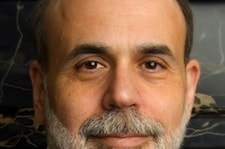 |
|
Bernanke: The Visible Hand |
For Ben Bernanke, a rocky eight-year tenure as chairman of the Federal Reserve Board is ending on a good note. The U.S. economy, teetering on the brink in the wake of the financial crisis that erupted in 2008, is finally showing signs of sustained recovery. GDP forecasts are calling for solid if unspectacular growth. Meanwhile, the jobless rate continues to drop, albeit slowly. And on his way out the door at the Fed, Bernanke himself is receiving plaudits from his peers as the man who helped avert a second Great Depression.
Had it not been for his leadership things could have been really bad, said Anil Kashyap, a professor of economics and finance at the University of Chicago Booth School of Business.
That appeared to be the general consensus of attendees at the gathering this month of the American Economic Association in Philadelphia, where Bernanke gave one of his last speeches as Fed head. There are many people who think they have 20/20 hindsight, Harvard University public policy and economics professor Kenneth Rogoff said. But I certainly can think of a lot of people and things that could have done worse.
In the speech, Bernanke himself gave a full-throated defense of his time at the Federal Reserve. The recovery has faced powerful headwinds, suggesting that economic growth might well have been considerably weaker, or even negative, without substantial monetary policy support. For the most part, research supports the conclusion that the combination of forward guidance and large-scale asset purchases has helped promote the recovery, he said.
Read the full text of Bernanke’s speech
But the central bank boss did not hide his frustration at the inability of the economics profession to explain the roots of the countrys relatively anemic growth. And he noted that it
is still unclear whether the productivity of U.S. workers has been permanently damaged by structural changes in the economy. The reasons for weak productivity growth are not entirely clear, Bernanke said.
His best guess? Typically, the former Princeton professor offered several.
It may be a result of the severity of the financial crisis, for example, if tight credit conditions have inhibited innovation, productivity-improving investments and the formation of new firms, he said. Or it may simply reflect slow growth in sales, which have led firms to use capital and labor less intensively. Or [it might be] mismeasurement.
Bernanke even suggested that the financial crisis might not be the culprit at all. Yet another possibility is that weak productivity growth reflects longer-term trends largely unrelated to the recession.
It remains to be seen if successor Janet Yellen can pinpoint the problemand then figure out how to fix it. For now, the U.S. economy is stable while slowly coming off life supporta scenario that didnt seem particularly likely during the dark days of 2008 and 2009. For that, the outgoing boss of the Federal Reserve deserves some credit.
As Kashyap noted, Bernanke did not want the first sentence of his Wikipedia page to be He studied the Great Depression and then caused the next one.’ And so he made sure that was not the case.



